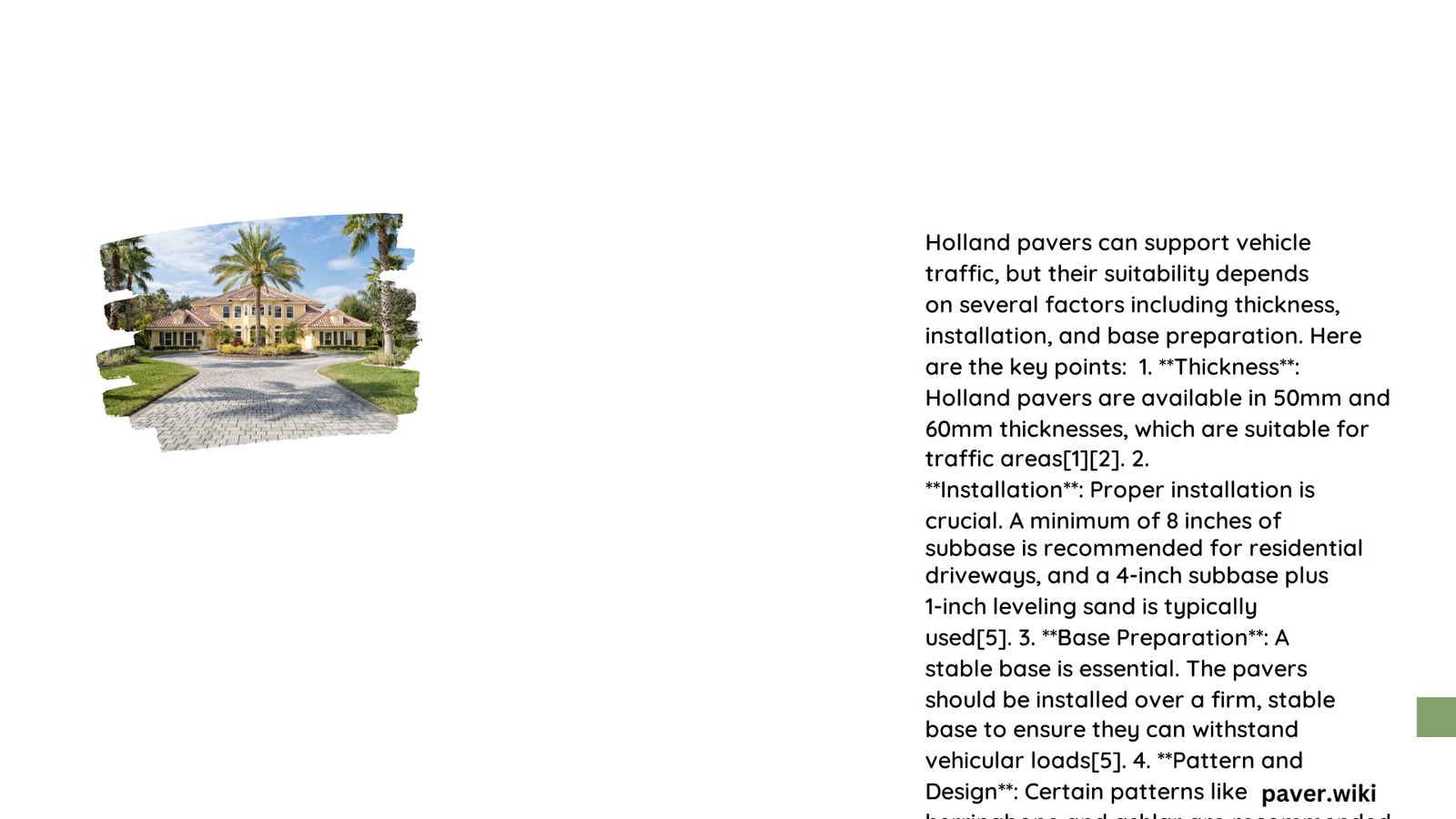Holland pavers represent a versatile and robust paving solution capable of supporting vehicle traffic across residential, commercial, and industrial applications. These specialized concrete pavers are engineered with multiple thickness options and advanced installation techniques that enable them to withstand different vehicle weights, from lightweight passenger cars to heavy commercial vehicles. Understanding their structural characteristics and proper installation methods is crucial for ensuring long-term performance and durability.
What Determines Vehicle Support Capacity of Holland Pavers?
How Do Paver Thickness Impact Vehicle Load?
Holland pavers come in multiple thickness variations, each designed for specific traffic requirements:
| Paver Thickness | Vehicle Load Capacity | Recommended Applications |
|---|---|---|
| 1-3/16″ (30mm) | Light Vehicle Traffic | Pedestrian walkways, light residential areas |
| 2-3/8″ (60mm) | Moderate Vehicle Traffic | Residential driveways, parking areas |
| 3-1/8″ (80mm) | Heavy Vehicle Traffic | Commercial zones, bus terminals, industrial sites |
What Installation Techniques Enhance Vehicle Support?
Proper installation is critical for supporting vehicle traffic. Key techniques include:
- Base Preparation
- Compact aggregate layer (4-6 inches depth)
- Use crushed stone or gravel
-
Ensure uniform, stable foundation
-
Sand Layer Requirements
- 1-2 inches of paver sand
- Thoroughly compacted
-
Provides additional load distribution
-
Interlocking Mechanism
- Precise paver placement
- Use mechanical compactors
- Ensure tight joint connections
Can Different Vehicle Types Impact Paver Performance?
Vehicle type significantly influences paver performance:
- Passenger Vehicles: Most Holland pavers easily support standard cars and light trucks
- Commercial Trucks: 3-1/8″ thick pavers recommended
- Heavy Equipment: Specialized installation with reinforced base required
What Factors Influence Long-Term Vehicle Traffic Durability?

How Do Environmental Conditions Affect Paver Performance?
Several environmental factors impact Holland paver durability:
- Temperature Variations: Admixtures like Hydrapel enhance freeze-thaw resistance
- UV Exposure: Modern pavers include UV-resistant materials
- Moisture Resistance: Polymeric sand helps prevent water penetration
What Maintenance Practices Extend Vehicle Traffic Support?
Recommended maintenance strategies:
- Regular joint sand replenishment
- Periodic base inspection
- Prompt repair of any settling or shifting
- Professional assessment every 5-7 years
Technical Considerations for Vehicle Traffic Support
What Load Testing Validates Paver Performance?
Manufacturers conduct rigorous load testing, including:
– Static load simulations
– Repeated traffic cycle tests
– Compression strength measurements
– Environmental stress evaluations
How Do Professional Installers Ensure Vehicle Traffic Readiness?
Professional installation involves:
– Precise grade calculations
– Advanced compaction techniques
– Specialized edge restraint systems
– Comprehensive site-specific assessment
Conclusion
Holland pavers offer robust vehicle traffic support when correctly selected, installed, and maintained. Choosing the appropriate thickness, preparing a stable base, and following manufacturer guidelines ensures long-lasting performance across various vehicle load scenarios.
Reference:
– Belgard Eco-Holland Pavers
– Patio Drummond Holland Pavers
– Midwest Manufacturing Holland Pavers
